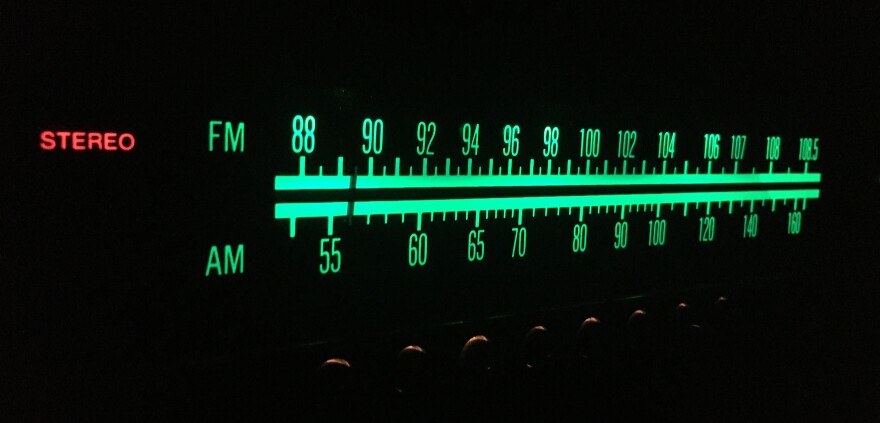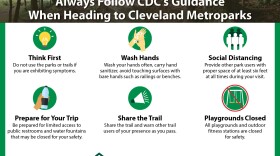It’s been another week of closed businesses, self-quarantine and “Wine with DeWine” in Ohio. And another week of changes in the state’s battle against coronavirus. Here are answers to questions you've submitted to OH Really?
Kabir: Our first few questions this week are about temperature.
Sarah: Specifically, laundry and how to make sure your clothes are free of coronavirus. We asked Dr. Erika Sobolewski from Summit County Public Health.
“[Just do] normal laundry care and [use] the hot cycle as well.”
Sarah: And Anthony Gardner wants to know if microwaving will kill coronavirus on carry out containers and food.
Kabir: Well, we have information on containers and how long it can live on them. The experts are saying to transfer your food to a new container once you get home.
Sarah: And then if you microwave it? Sobolewski says, “There’s really no evidence right now that the virus is carried on food or water.”
Kabir: We also received a pair of questions about whether — with warmer temperatures coming — mosquitos could carry coronavirus or cause COVID-19?
Sarah: Sobolewski says there’s no evidence of that, either. Of course, they could always discover something different in the future since this disease is so new and the research on it up to now has been limited.
Ohio agriculture
Sarah: Nicole Wright wants to know what the state is doing to help farmers. So we asked Ty Higgins, spokesman for the Ohio Farm Bureau.
“We’ve seen some really great programs introduced at the federal level that have to do with agriculture. In fact, $23.5 billion of that stimulus package is for farmers and ranchers across the country to be able to sustain the heavy hit they’re taking, economically, because of this.
“One of the things that was really helpful was making sure our workforce was solid and sustainable. Many workers — when it comes to fruits and vegetables — they’re immigrant workers. They come in on a guest worker program. The consulate in Mexico, during this very beginning of the COVID-19 pandemic, was shutting down the H-2A visa guest worker program – not letting those workers renew for 2020. With the help of Ohio Farm Bureau and many in agriculture, we were able to get the consulate to wave renewing those H-2A visas to last for the entire [year]. So we kept those workers intact.
“On the state front, there are small business programs that are being introduced.” Higgins also cites the governor’s support for the entire food chain. And he says milk prices are down 26-36 percent, and demand is also down since restaurants and school cafeterias are closed. At the same time, some stores are limiting the amount of milk consumers can buy – leading to a large surplus for farmers. Higgins is asking consumers to get involved and communicate with the American Dairy Association Mideast:
Emergency Alert System
Kabir: Our next question is from Lynette Brown, who wants to know about the audio quality of the Emergency Alert System. She says, “we're used to the periodic tests. But when there is a real emergency, there’s no way a normal human could understand what’s being said.”
Sarah: To find out why the system sounds the way it does, here’s Frank Foti, Executive Chairman of The Telos Alliance, a Cleveland-based maker of broadcasting equipment.
He says the link between stations -- or from the Emergency Alert System network -- is usually a lower quality audio link. Much of the audio is sent over IP, which has a low bit-rate. In years past, the audio bandwidth was limited to a range of about 300 Hz-3 Khz, even though human hearing often extends to about 20 kHz. Another reason for the sound quality is that some of the alerts are taken directly off-the-air from AM stations (known as “Local Primary” stations), which already have lower audio quality compared to FM.
Foti asks, “Can it be improved? Of course it can. I would imagine that since the EAS system [is run] by FEMA, I would think especially now -- with the crazy situation that we have going on -- we’ll probably see some federal money become available so FEMA can put in nice network connections to all radio stations. And that way, you’d be able to have much better audio fidelity when the tests are going on.”
Here, he explains some of the technical issues with modern AM radio reception:
The Bureau of Motor Vehicles
Kabir: Our next question is from David Seese. He wants to know about the Bureau of Motor Vehicles.
Sarah: All but five of the BMVs in the state are closed, and they’re only registering commercial vehicles, or giving driver’s tests for CDLs. So Mr. Seese wants to know, how does one title a passenger vehicle, and how is law enforcement handling the situation?
Kabir: According to the Secretary of State’s website, law enforcement has been directed to use “discretion to adjust enforcement” and is being “asked to give consideration to a driver” when it comes to expired licenses. The TSA will also be giving people leeway to use an expired license once we can travel again.
Sarah: What about if you need to title a vehicle you bought from a dealer or in a private party sale?
Kabir: Those will require temporary tags. If you buy from a dealer, they usually do that for you. If not -- or if it’s a private sale -- you need to get temporary tags at oplates.com. You’ll have to upload a copy of your driver’s license or ID and the front and back of the title. Which, by the way, has to be notarized. And that’s already standard procedure in Ohio for car titles.
Sarah: What if this lasts a long time and your tags expire?
Kabir: Then you have to go to back to oplates.com and apply for what’s called a “Hardship Temporary Tag.”
These Deputy Registrar and Driver Examination stations will be open for CDL and commercial related services:
Central
Deputy Registrar: 4503 Kenny Road, Columbus 43220
Driver Exam Station: 4738 Cemetery Road, Columbus 43026
Northeast
Deputy Registrar: 7000 Biddulph Road, Brooklyn 44144
Driver Exam Station: 12000 Snow Road, Parma, OH 44130
Southeast
Deputy Registrar/Driver Exam Station: 142 Gross Street, Marietta 45750
Northwest
Deputy Registrar/Driver Exam Station: 1616 E. Wooster Street, Suite 30, Bowling Green 43402
Southwest
Deputy Registrar: 10938 Hamilton Avenue, Mt. Healthy 45231
Driver Exam Station: 10940 Hamilton Avenue, Cincinnati 45231
Essential businesses
Kabir: We’re still getting questions about which businesses are essential or not.
Sarah: In Summit County, the health department has been interfacing with companies who remain open but are being reported as non-essential. Some are being shut down, others are scaling back, and still others are actually being allowed to stay open. The Beacon Journal reported that a few car washes re-opened because they have government contracts to wash police and fire vehicles.
Kabir: And I know there’s at least one Summit County book store that has stayed open because they provide materials for the public schools. But while we can’t list specific businesses, the governor’s order lays out the job categories which are essential.
You can ask your question about coronavirus for “OH Really?” by clicking here.








